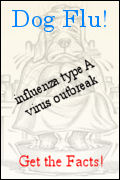|
|
Past Newsletters

The CSPCA Charitable Trust needs your support through donations to continue vital research projects. Your donation is tax deductible.

RASP (Rescue A Shar-Pei) is a volunteer group with a concern for abandoned and abused Shar-Pei in Illinois / Indiana / Wisconsin and surrounding areas.
|


|

|
|

Volume 1, Issue 1
April 1997
This Issue:
Familial Sar-Pei Fever (FSF), Lymes' Disease,
Flea Products, Heartworm Disease, CSPCA Charitable Trust
Familial Shar-Pei Fever (FSF)
[ top ]
Familial Shar-Pei Fever (FSF) is a disease that appears to be unique to the
Chinese Shar-Pei breed. The chief clinical sign is a very high fever of short
duration. The temperature generally runs between 105 - 107°F and lasts 12 - 36
hours. Often this is accompanied by painful swelling o one or both hock (ankle)
joints in the rear legs. The hock is often very warm to the touch.
It is important to remember that the hock swelling is an inconsistent feature of
FSF - the fever is always present.
The disease is hereditary and appears to be identical to a disease seen in man
called Familial Mediterranean Fever.
Other clinical signs are: a "sick" dog look, roached(arched) back, pacing,
vomiting, lethargy, loss of appetite and/or laying around. Always check the
temperature in a sick Shar-Pei. This is easily done with a rectal thermometer placed in
the rectum about 1 inch and left for about 1 minute. The normal temperature should
be 101-102°F.
What causes FSF? Current research indicates the disease is caused by a
genetic defect that causes increased levels of Interleukin 6. This is a messenger
in the body that stimulates inflammation. This results in fever, swelling and pain.
Work is currently underway at the University of Missouri college of Veterinary Medicine
at Columbia on the development of a DNA blood test to screen for individuals that
carry the defective gene. This test will help breeders screen their breeding stock
and allow them to select only those individuals don't carry the defective gene.
This research is being funded by the CSPCA Charitable Trust and I'll give you
more information later in this newsletter if you want to help.
Treatment ? Treatment during an episode is mainly supportive. With the first
episode I like to do a complete work up including a CBC (complete blood count),
a health panel to evaluate liver and an immune panel. I usually start aspirin
therapy to decrease the fever. I use Ascriptin® regular strength, 1 tablet every
6 hours the first 24 hours and then 1 tablet twice a day for 2-3 days. I offer
small amounts of water frequently and don't worry about feeding them until the episode
is over. Monitoring the temperature is very important to see that we get a response to
the aspirin. Dogs that don't respond need emergency care.
Follow-up ? Individuals with FSF have an increased risk for developing a type
of kidney failure known as Renal Amyloidosis as well as other types of immune-mediated
kidney disease. In dogs with repeated episodes of FSF a drug called colchicine is
dispensed as a life-long preventative measure. It is experimental, but has been
shown to decrease the incidence of Renal Amyloidosis in people with this condition.
I strongly advise that all Shar-Pei have a urine sample checked 3-4 times a year whether
they've had FSF or not. The uranalysis is a simple screening test for kidney
disease. I advise taking up the dog's water overnight and getting a sample the first
thing in the morning. It is also a great idea to do blood panels at least 1-2 times a
year in Shar-Pei between the ages of 2 - 6 years of age, especially breeding stock.
We lose many Shar-Pei in this age group due to kidney failure and early recognition
allows us to take some preventive measures.
Other things you can do include weighing you dog frequently, monitoring water consumption
and urination, watch for decreases in muzzle size and feed a diet low in protein
(18-22%). Hopefully, FSF will be a disease of the past soon.
Lymes' Disease
[ top ]
 Lymes' Disease Found in Ticks in Cook County! This is a recent headline
you may have been seeing recently. Lymes' disease is not a new threat, but is
gaining a foothold in northern Illinois and in our area. The cause of Lyme's disease
is the spirochete Borrelia burgdorferi. This Organism is carried by the deer tick.
This tick has a 2-year life cycle. The larval tick feeds on small mammals primarily
the white-footed mouse which is the main reservoir for the spirochete. The larval ticks
become infected and, as adults feed on the white-tailed deer. Deer are important
for the mechanical spread of the ticks carrying the disease. Dogs develop Lyme's
disease when infected ticks feed on them. The disease, in dogs, presents as
musculoskeletal problems, cardiac disease and kidney disease. The main presentation
is the musculoskeletal form. Here the dog is systemically ill with a fever, swollen
joints an lameness. A blood test is available to screen for the disease in suspect
animals. Treatment is antibiotic therapy, but relapses are common. The disease is not
directly transmissible form dog to man -- tick transmission is necessary.
Lymes' Disease Found in Ticks in Cook County! This is a recent headline
you may have been seeing recently. Lymes' disease is not a new threat, but is
gaining a foothold in northern Illinois and in our area. The cause of Lyme's disease
is the spirochete Borrelia burgdorferi. This Organism is carried by the deer tick.
This tick has a 2-year life cycle. The larval tick feeds on small mammals primarily
the white-footed mouse which is the main reservoir for the spirochete. The larval ticks
become infected and, as adults feed on the white-tailed deer. Deer are important
for the mechanical spread of the ticks carrying the disease. Dogs develop Lyme's
disease when infected ticks feed on them. The disease, in dogs, presents as
musculoskeletal problems, cardiac disease and kidney disease. The main presentation
is the musculoskeletal form. Here the dog is systemically ill with a fever, swollen
joints an lameness. A blood test is available to screen for the disease in suspect
animals. Treatment is antibiotic therapy, but relapses are common. The disease is not
directly transmissible form dog to man -- tick transmission is necessary.
Control and prevention involves tick control using a variety of products. ProTICall®,
and Frontline® are two spot-on formulations that work well, and avoidance of
areas where the disease may be prevalent. The disease has a higher incidence in the
spring and summer so be especially careful during these times of the year. This means
any areas where ticks, deer and mice can be found together such as rural
wooded areas, forest preserves, etc. Checking your dog frequently for ticks is
another safe-guard. The deer tick is fairly small, but check your dog around the
ears, neck, back and chest.
There is a vaccine available. It should be used in those dogs considered high risk
for the development of Lyme's disease. This would include those dogs who are exercised
in potential tick areas such as a forest preserve or other wooded areas, hunting dogs,
and those dogs which travel into Lyme's areas such as Wisconsin or Michigan. Even
in vaccinated dogs tick control should be instituted.
New Flea Products - Help in the War on Fleas
[ top ]
Several new products in the fight against fleas and ticks have been added over the
past several months. Program®, the flea pill, is available. It contains
Iufenuron, a chemical that sterilizes adult fleas causing them to produce eggs that
don't hatch. It is given monthly. Advantage® is a monthly spot-on product
that is applied to the skin of the shoulder area. It spreads over the skin in several
hours and kills adult fleas on contact. Frontline® is another monthly
spon-on product that is useful against fleas ant ticks.
Heartworm Season Is Here
[ top ]
With the advent of warmer Spring weather it's time to get you dog tested for
heartworm disease and be placed on preventative medication.
Recall that heartworm disease is transmitted by mosquitoes and so any dog who gets
outside for any length of time is susceptible. A simple blood test checks for the
presence of adult worms or the presence of baby heartworms (microfilaria) in the blood.
If the dog is negative, monthly preventative medication, Heartgard®, can be started.
It takes roughly 6 months to develop a positive test if the dog was bitten by an
infected mosquito so we recommend testing in the spring. A minimal recommendation
is to test yearly. Even dogs who have been on preventative should be tested annually.
The preventative is very safe and is not poisonous.
A new treatment is now available. In the past, intravenous injections of arsenic had be be given
to eliminate adult heartworm infection. A new product called Immiticide® is now
being used. It is an intramuscular arsenic that requires fewer injections and has
fewer side effects.
The cost of prevention is much less than the treatment of heartworm disease and
much easier on you dog. Have your dog tested!
CSPCA Charitable Trust
[ top ]
The CSPCA Charitable trust in a non-profit trust set up by the Chinese Shar-Pei
Club of America, Inc. to fund research into the health problems of the Chinese Shar-Pei.
Send your tax-deductible gift to:
Lee Arnold, Chairman
P.O. Box 7007
Bedminster, NJ 07921
Everyone who sends a donation amounting to $50.00 or more will receive a special Shar-Pei
Guardian Angel pin made of sterling silver.
|
|

